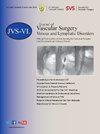Perioperative and intermediate outcomes of patients with pulmonary embolism undergoing catheter-directed thrombolysis vs percutaneous mechanical thrombectomy
IF 2.8
2区 医学
Q2 PERIPHERAL VASCULAR DISEASE
Journal of vascular surgery. Venous and lymphatic disorders
Pub Date : 2024-08-05
DOI:10.1016/j.jvsv.2024.101958
引用次数: 0
Abstract
Objective
Thrombolytic therapy has been a mainstay of treatment for massive or submassive pulmonary embolism (PE), a common and highly morbid pathology. New percutaneous mechanical thrombectomy (PMT) devices have recently become widely available and have been used increasingly for the treatment of acute PE, but evidence demonstrating its efficacy over standard catheter-directed lytic protocol remains limited.
Methods
Using TriNetX Data Network, a global federated database of >250 million patients, we conducted a retrospective cohort study of patients from January 2017 to August 2023 with a diagnosis of PE, treated with either PMT or catheter-directed thrombolysis (CDT). Eligible patients were 1:1 propensity score-matched for preoperative covariates including demographics and comorbidities. We calculated and compared the 30-day outcomes of all-cause mortality, bleeding complications (blood transfusion, gastrointestinal bleed, and intracranial hemorrhage), diagnosis of acute respiratory failure (RF), myocardial infarction (MI), and pulmonary hypertension (PH) using odds ratios (OR) with 95% confidence intervals (CIs). Also, the 5-year outcomes of all-cause mortality, a composite outcome of chronic PH (chronic PE, chronic cor pulmonale, chronic thromboembolic PH), right heart failure (RHF), RF, and emergency department visits, were compared using hazard ratios (HRs) with 95% CIs.
Results
We identified 2978 patients treated with PMT and 1137 patients treated with CDT. After matching, we compared 1102 patients in each cohort. For 30-day outcomes, all-cause mortality, acute RF, and blood transfusion were similar between the two groups. However, compared with CDT, PMT was associated with a better safety profile, including lower bleeding risk for both ICH (OR, 0.46; 95% CI, 0.24-0.890) and gastrointestinal bleed (OR, 0.42; 95% CI, 0.28-0.63). PMT also demonstrated better immediate functional outcomes, with less PH (OR, 0.53; 95% CI, 0.41-0.68) and MI (OR, 0.54; 95% CI, 0.41-0.76). At 5 years, the all-cause mortality and RF for both procedures were similar, but PMT was associated with lower rates of chronic PH (HR, 0.70; 95% CI, 0.55-0.90), RHF (HR 0.49; 95% CI, 0.37-0.65), and emergency department visits (348 for PMT vs 426 for CDT; P < .01).
Conclusions
In patients undergoing catheter-based therapy for PE, PMT has an improved procedural safety profile vs CDT and results in significantly fewer 30-day postoperative complications, with fewer bleeding events, and is also associated with fewer periprocedural MIs and less acute PH. Perhaps, more important, PMT also demonstrated improved long-term outcomes with significantly fewer chronic PH and RHF diagnoses with fewer emergency department visits.
接受导管引导溶栓术与经皮机械取栓术的肺栓塞患者的围手术期和中期疗效对比。
目的:溶栓疗法一直是治疗大面积或亚大面积肺栓塞(PE)的主要方法,这是一种常见的高发病率病症。新型经皮机械血栓切除装置最近已广泛普及,并越来越多地被用于治疗急性肺栓塞,但证明其疗效优于标准导管引导溶栓方案的证据仍然有限:我们利用拥有超过 2.5 亿患者的全球联合数据库 TriNetX 数据网络,对 2017 年 1 月至 2023 年 8 月期间诊断为 PE、接受经皮机械取栓术(PMT)或导管引导溶栓术(CDT)治疗的患者进行了一项回顾性队列研究。符合条件的患者在术前进行了 1:1 的倾向评分匹配,包括人口统计学和合并症。我们使用几率比(OR)和 95% 置信区间(CI)计算并比较了全因死亡率、出血并发症(输血、消化道(GI)出血和颅内出血(ICH))、急性呼吸衰竭(RF)诊断、心肌梗死(MI)和肺动脉高压(PH)的 30 天预后。此外,还使用危险比(HR)和 95% 置信区间(CI)比较了全因死亡率、慢性 PH(慢性 PE、慢性肺心病、慢性血栓栓塞性 PH (CTEPH))、右心衰 (RHF)、RF 和急诊科就诊率的 5 年结果:我们确定了 2978 名接受 PMT 治疗的患者和 1137 名接受 CDT 治疗的患者。配对后,我们对每个队列中的 1102 名患者进行了比较。就 30 天的结果而言,两组患者的全因死亡率、急性射频和输血量相似。然而,与 CDT 相比,PMT 的安全性更好,包括 ICH(OR [95% CI] = 0.46 [0.24-0.890])和消化道出血(OR [95% CI] = 0.42 [0.28-0.63])的出血风险更低。PMT 还显示出较好的近期功能预后,PH(OR [95% CI] = 0.53 [0.41-0.68])和心肌梗死(OR [95% CI] = 0.54 [0.41-0.76])较少。5年后,两种手术的全因死亡率和RF值相似,但PMT与较低的慢性PH(HR [95%CI] = 0.70 [0.55-0.90])、RHF(HR [95% CI] = 0.49 [0.37-0.65])和ED就诊率相关(PMT为348例,CDT为426例,P结论:对于接受导管治疗的 PE 患者,与 CDT 相比,PMT 的手术安全性更高,术后 30 天的并发症明显减少,出血事件也更少,而且围手术期心肌梗死和急性 PH 的发生率也更低。也许更重要的是,PMT 的长期疗效也有所改善,慢性 PH 和 RHF 诊断明显减少,ED 就诊次数也减少了。
本文章由计算机程序翻译,如有差异,请以英文原文为准。
求助全文
约1分钟内获得全文
求助全文
来源期刊

Journal of vascular surgery. Venous and lymphatic disorders
SURGERYPERIPHERAL VASCULAR DISEASE&n-PERIPHERAL VASCULAR DISEASE
CiteScore
6.30
自引率
18.80%
发文量
328
审稿时长
71 days
期刊介绍:
Journal of Vascular Surgery: Venous and Lymphatic Disorders is one of a series of specialist journals launched by the Journal of Vascular Surgery. It aims to be the premier international Journal of medical, endovascular and surgical management of venous and lymphatic disorders. It publishes high quality clinical, research, case reports, techniques, and practice manuscripts related to all aspects of venous and lymphatic disorders, including malformations and wound care, with an emphasis on the practicing clinician. The journal seeks to provide novel and timely information to vascular surgeons, interventionalists, phlebologists, wound care specialists, and allied health professionals who treat patients presenting with vascular and lymphatic disorders. As the official publication of The Society for Vascular Surgery and the American Venous Forum, the Journal will publish, after peer review, selected papers presented at the annual meeting of these organizations and affiliated vascular societies, as well as original articles from members and non-members.
 求助内容:
求助内容: 应助结果提醒方式:
应助结果提醒方式:


